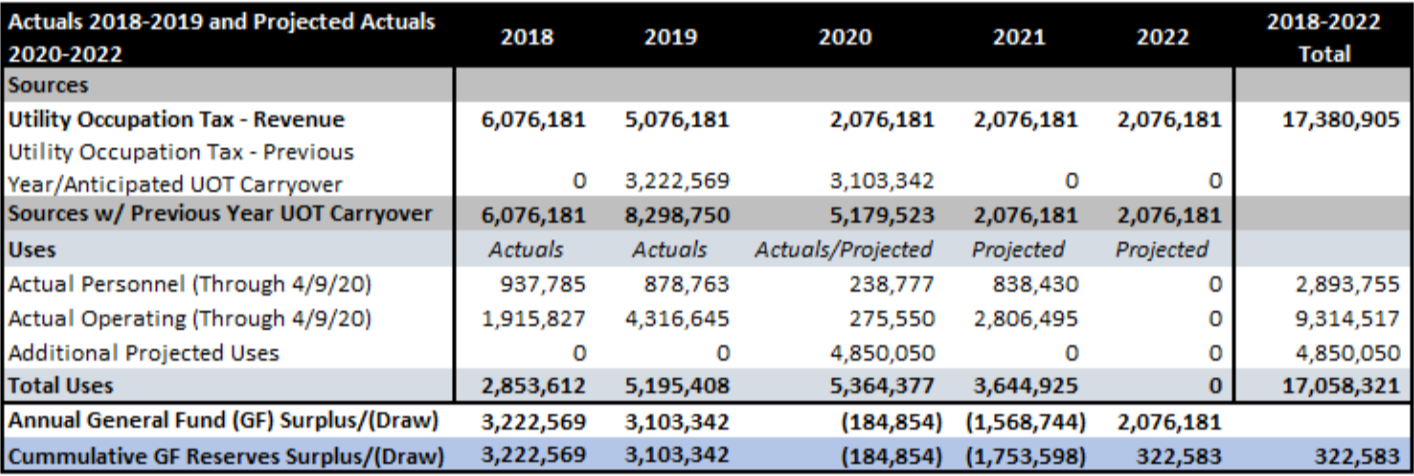Boulder may borrow $185K from cash-strapped general fund to keep muni going

Saturday, April 18, 2020 (Updated Monday, April 20)
Boulder my need to borrow nearly $185,000 from its over-tapped general fund to keep its nearly decade-long effort to create a city-owned electric utility, according to a quarterly update shared with council Thursday evening. More then $26.4 million has been spent to date on what has been christened Local PowerWhat the city of Boulder calls the muni, a tab that will stretch past $30 million by next year when voters may or may not get a final say on moving forward with the multi-million takeover of Xcel’s assets.
The muniA utility that would be owned by the city of Boulder. Shorthand for municipalization, which is the p..., as it’s colloquially referred to, is facing more than one headwind: Running out of money as Boulder looks to strip its budget to weather the COVID crisis; facing a citizen-led effort to divert money away from the project and instead invest in other climate change-combatting measures. Yet Boulder’s push for local control has weathered plenty of storms before, surviving multiple court cases and regulatory proceedings and five votes of the people.
The most recent was in 2017, extending the utility occupation tax that funds most of the muni. The five-year extension was meant to pay for three year of engineering work, staff time and court battles. By 2020, a go/no-go vote was supposed to be held. Critics always questioned the date, and staff in December said 2021 was more likely, due to longer-than-expected negotiations with XcelXcel Energy, a publicly traded utility company based in Minnesota..
Those delays left a funding gap. Staff planned to ask voters for more cash this year, but City Attorney Tom Carr said on Monday a ballot question wasn’t being pursued due to economic conditions created by COVID-19.
Boulder is operating under a best-case projection in which $28 million of revenue is lost, including more than $15 million from the all-purpose general fund that pays for police, fire, the library, etc. Local Power may need to draw $184,854 from the general fund to pay for part of the anticipated 2020 spending not covered by the UOTUtility Occupation Tax. The first part was initially passed in 2010 by voters, to replace the Xcel f..., which will bring in 59% fewer dollars than in 2019.

The UOT is collected by Xcel on customers bills and remitted to Boulder. When voters OK’d an extension in 2017, the city planned for the $17.3 million to be collected over five years, so that utility bill increases would be spread out longer.
The money was always intended to fund three years of work: 2018, 2019 and 2020, by which time the project would be complete, the costs to move forward known and voters would get a say on whether or not they wanted to foot that bill.
As that stretched into four — the Public Utility Commission process taking longer than anticipated — the pre-determined timeline became a problem. Work is still ongoing, but the money to pay for it hasn’t come in yet.
Back for more — maybe
The muni has tapped the general fund before, drawing $1.45 million between 2012 and 2017. That money is technically borrowed, but as staff noted in a council packet, it will only be repaid “if/when the local electric utility is operational.”
Whatever is borrowed in 2020 and 2021 will be paid back in 2022, spokeswoman Emily Sandoval clarified Monday. UOT funds that year could also help pay down some of the $1.45 million borrowed from 2012-2017.
Council may not be in a giving mood. Councilman Bob Yates, long a muni opponent, has already called into question the wisdom of earmarking funds for the project in a time of economic uncertainty. During a Monday morning scheduling meeting, Mayor Sam Weaver noted that it may be politically unpalatable to advance Local Power the cash it needs.
“Some of the feedback we’ve gotten from community members is borrowing $185,00 from general fund is not going to be appropriate this year,” Weaver said. “I don’t think that’s going to be acceptable right now.”
If council refuses to allocate funds to Local Power, staff will look to pause what work it can, Director Steve Catanach said Monday.
“We can’t slow down court cases,” he said, referring to the city’s ongoing condemnation attempts. But “we could certainly slow down things we control” such as engineering work.
However, that might come with more costs in the long run.
“There is the risk you incur costs when you stop,” Catanach said. “It will be important that we look at each individual task to see what cost would be” if/when we picked it back up in the future.
Team member furloughed
Including “indirect” staffing costs, $26,441,279 has been spent on Local Power through April 9, 2020. That is projected to rise to $34.94 million by 2022 — though, notably, that figure doesn’t any 2022 expenditures or indirect staffing costs for 2020-2022 (which are calculated separately).
There are seven staff members working full-time on the muni, while 20 other city employees contributed some of their time to the effort in 2019. Nearly $1.2 million was spent on staffing in 2019: $311,189 on indirect staffing and $878,763 on full-time employees.
One of the core team was furloughed in recent cost-saving moves, according to city spokesperson Patrick von Keyserling.
One-quarter of Boulder’s climate initiatives staff was shed in the furloughs. (Many of the cuts were to seasonal and temporary positions that tend to concentrate in certain departments such as parks and recreation, open space and the library.)
The Daily Camera reported on Tuesday that Boulder’s third attempt to condemn Xcel’s assets was paused by a court. Boulder has appealed a dismissal of their second try; while that case is ongoing, the judge ruled, the current litigation should be shelved.
The second condemnation suit was dismissed because, at the time, Boulder and Xcel were still seeking to satisfy conditions laid down by state regulators. That process concluded in October, followed by a rejected $94 million bid for the utility company’s assets — excluding substations — in city limits.
Facility studies for six substations were completed in the fourth quarter of last year, according to notes shared with council. SubstationWhere voltage is transformed from high to low (or vice versa) for transmission onto nearby lines. design work for both Xcel and the city has begun, and the utility company’s separation design is completed.
Boulder is also responsible for Xcel’s costs, including attorney’s fees, as dictated by the PUCPublic Utilities Commission, Colorado’s regulatory body for utilities such as water and electricit.... Thursday’s update revealed that the city has reimbursed the utility company nearly $3.6 million thus far.
The next update on the muni will be given in July.
Authors note: This story has been updated to clarify repayment of monies borrowed from the general fund, and to add in comments from Mayor Sam Weaver made Monday.
— Shay Castle, boulderbeatnews@gmail.com, @shayshinecastle
Want more stories like this, delivered straight to your inbox? Click here to sign up for a weekly newsletter from Boulder Beat.
Budget COVID-19 Municipalization Boulder budget City Attorney city council city of Boulder COVID COVID-19 general fund muni municipalization pandemic Tom Carr Utility Occupation Tax Xcel Energy


The numbers in the table above are strange. The table shows only $239K in personnel spending this year, whereas 2019 and 2019, as well as the projection for 2021, show around $900K. Meanwhile the overwhelming majority of budgeted spending for 2020 is $4,850,050 for “Additional Projected Uses”, whatever that means. Do you have insight into what’s behind these numbers?
Hi, Kurt, I do. (Btw, I ask that commenters use their full first and last name to promote transparency.) The 2020 numbers are low bc that’s what has been spent through April 9. I believe (though I could be wrong) that the additional spending is what they anticipate to spend on staff time and operations for the remainder of the year.
Ah, I should have read the first column more carefully. Thanks.
I don’t think it’s made entirely clear by that chart. I just had more info. I’m sorry the story wasn’t more clear!